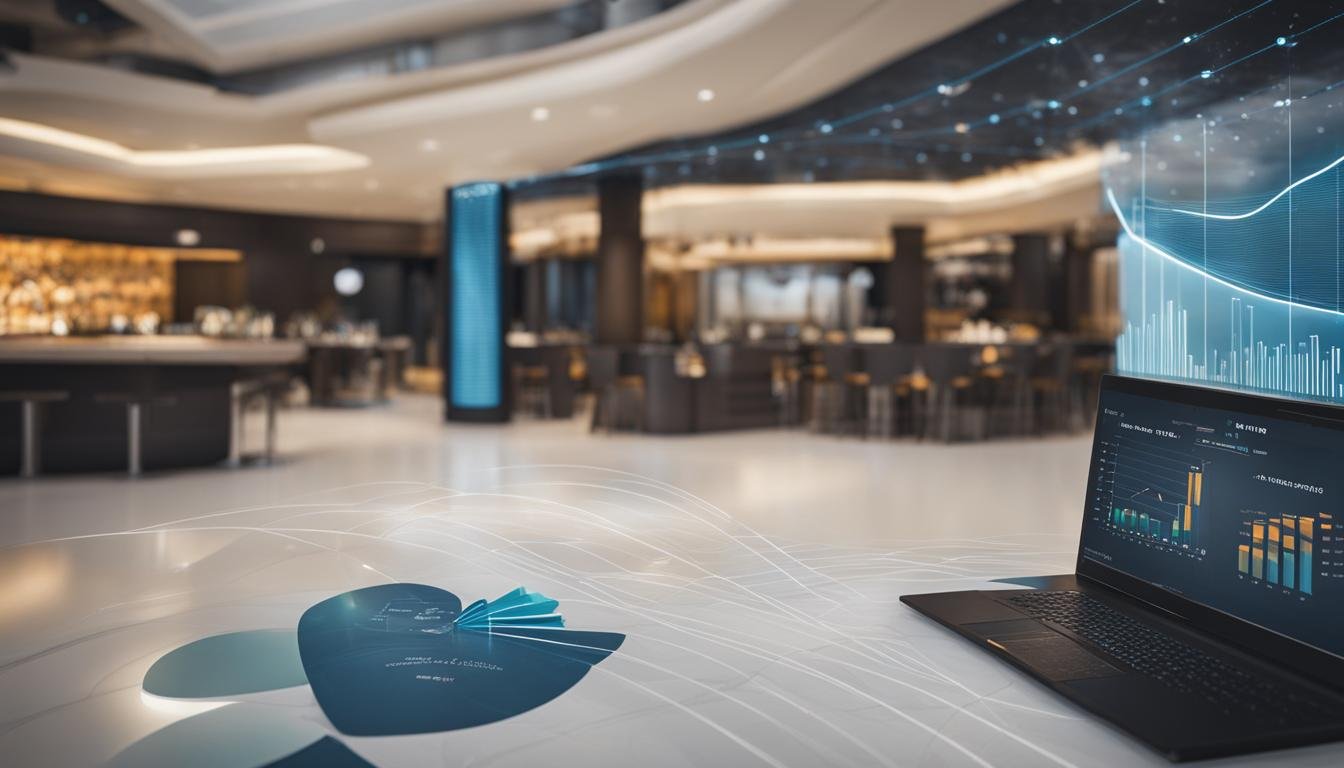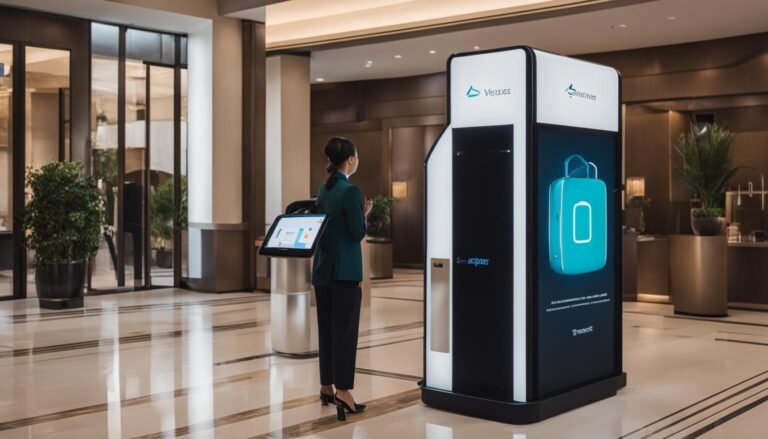Data Analytics and Its Role in Hospitality Decision-Making
In recent years, data analytics has emerged as a game-changer in the hospitality industry, revolutionizing the way hotels make critical business decisions. By harnessing the power of data, hotels can gain valuable insights that can drive their success. From revenue management to guest experiences, marketing effectiveness to scouting the competition, data analytics has become an indispensable tool for decision-makers in the hospitality industry.
Key Takeaways:
- Data analytics is reshaping the hospitality industry by providing insights that redefine business strategies.
- Hotels can improve revenue management by analyzing data on accommodation demand, price-value ratio, and competitor analysis.
- Data analytics enhances services and guest experiences by analyzing feedback, identifying strengths and weaknesses, and leveraging big data.
- Hotels can optimize marketing efforts through data analytics by targeting specific market segments and understanding guest preferences.
- Data analytics helps hotels stay ahead of the competition by scouting the business environment, analyzing competitor data, and improving services.
Improving Revenue Management Through Data Analytics
Data analytics plays a crucial role in helping hotels develop effective revenue management strategies. By analyzing data from various sources, such as internet information, hotels can gain valuable insights into accommodation demand, determine the optimal price-value ratio for guests, and monitor their competitiveness in comparison to similar properties.
One key aspect of revenue management is analyzing and utilizing data on current bookings and past occupancy levels. By understanding booking patterns and occupancy trends, hotels can make informed decisions about pricing and availability, maximizing their revenue potential.
Another important factor in revenue management is conducting competitive analysis. By analyzing data on competitor rates and pricing strategies, hotels can adjust their own pricing to remain competitive in the market. This analysis helps hotels determine the optimal pricing for their rooms and increase bookings.
| Data Analytics for Revenue Management | Key Performance Statistics |
|---|---|
| Accommodation Demand Analysis | Occupancy Rates |
| Price-Value Ratio Optimization | Revenue per Booking |
| Competitive Analysis | Average Daily Rate |
By leveraging data analytics for revenue management, hotels can make data-driven decisions that optimize their pricing strategies, increase occupancy rates, and ultimately drive revenue growth.
Enhancing Services and Guest Experiences with Data Analytics
Data analytics plays a vital role in enhancing services and guest experiences in the hospitality industry. By leveraging the power of data, hotels can gather valuable insights from guest feedback and social media platforms to make informed decisions and improve their offerings. This allows hotel owners and managers to identify and address property strengths and weaknesses, gain new perspectives, and attract more customers.
Guest Feedback: A Valuable Source of Information
Guest feedback is a goldmine of information that hotels can tap into using data analytics. By analyzing guest reviews and surveys, hotels can gain a deeper understanding of customer preferences, identify areas for improvement, and tailor their services to meet guest expectations. This enables hotels to enhance guest experiences, leading to increased customer satisfaction and loyalty.
Guest feedback is a crucial asset in the hospitality industry. By actively listening to what guests have to say, hotels can continuously improve and provide exceptional experiences.
Data analytics also allows hotels to identify patterns and trends in guest feedback, enabling them to make data-driven decisions. By recognizing recurring themes or issues, hotels can implement proactive measures to prevent or mitigate potential problems, resulting in improved guest satisfaction and overall service quality.
Leveraging Social Media and Big Data
Social media platforms provide a wealth of information that can be harnessed through data analytics. Hotels can analyze social media interactions, monitor guest sentiment, and identify trends to optimize their marketing efforts and communication strategies. By understanding what guests are saying on social media, hotels can engage in real-time conversations, respond to queries and concerns promptly, and manage their online reputation effectively.
Moreover, big data analysis allows hotels to gain insights into customer behaviors and preferences. By examining large volumes of data, hotels can identify patterns, trends, and correlations that can guide their decision-making processes. These insights enable hotels to offer personalized experiences, attract new customers, and increase sales by tailoring their marketing campaigns to specific target audiences.
Improving Sales and Attracting Customers
Data analytics has the power to significantly improve sales and customer attraction in the hospitality industry. By analyzing guest data and identifying customer segments, hotels can develop targeted marketing strategies to effectively reach their intended audience. This allows hotels to showcase relevant offerings and experiences, increasing the likelihood of converting potential customers into loyal guests.
| Benefits of Data Analytics for Enhancing Services and Guest Experiences |
|---|
| 1. Improved understanding of customer preferences |
| 2. Proactive identification and resolution of issues |
| 3. Real-time engagement and reputation management |
| 4. Personalized experiences and targeted marketing |
In conclusion, data analytics empowers hotels to enhance their services and guest experiences by leveraging valuable insights from guest feedback, social media platforms, and big data analysis. By utilizing data-driven strategies, hotels can improve customer satisfaction, attract new guests, and ultimately achieve long-term success in the competitive hospitality industry.
Improving Marketing Effectiveness Through Data Analytics
Data analytics is a powerful tool that can significantly enhance the marketing efforts of hotels in the hospitality industry. By leveraging data analytics, hotels can gain valuable insights into market segments and guest preferences, enabling them to optimize their marketing strategies and target specific customer groups more effectively.
One of the key benefits of data analytics in marketing is the ability to understand market segments. By analyzing data on customer demographics, behavior, and preferences, hotels can identify distinct groups of guests and tailor their marketing campaigns accordingly. This targeted marketing approach allows hotels to showcase relevant offerings and activities to different customer segments, increasing the likelihood of attracting their desired audience.
Moreover, data analytics enables hotels to gain a competitive edge by conducting competitor analysis. By analyzing data on competitor strategies and performance, hotels can identify areas where they can differentiate themselves and devise marketing tactics to beat the competition. This information helps hotels stay informed about the market landscape and make informed decisions to position themselves effectively.
Demographic targeting is another valuable aspect of data analytics in marketing. By analyzing data on guest demographics and preferences, hotels can craft personalized marketing messages that resonate with their target audience. This level of personalization increases the chances of attracting and engaging business and family travelers, who often have distinct preferences and requirements.
Table: Key Data Analytics Insights for Marketing Effectiveness
| Data Analytics Insight | Description |
|---|---|
| Market Segments | Analyze guest demographics and behavior to identify distinct market segments and customize marketing efforts. |
| Guest Preferences | Analyze data on guest preferences to tailor marketing messages and offerings to specific customer groups. |
| Competitor Analysis | Analyze competitor strategies and performance to devise marketing tactics that differentiate the hotel and beat the competition. |
| Demographic Targeting | Utilize data on guest demographics and preferences to craft personalized marketing messages for business and family travelers. |
By harnessing the power of data analytics, hotels can significantly enhance their marketing effectiveness. Understanding market segments, guest preferences, and competitors’ strategies enables hotels to develop targeted marketing campaigns that resonate with their target audience and differentiate themselves from competitors. With data analytics, hotels can make informed decisions and optimize their marketing efforts to stay ahead of the competition and attract the right guests.
Scouting the Business Environment and Competition with Data Analytics
In today’s rapidly evolving business landscape, staying ahead of the competition is crucial for hotels to thrive. By leveraging the power of data analytics, hotels can gain valuable insights into the business environment and competition in real-time. This enables them to make informed decisions and implement strategies that give them a competitive edge.
One of the key ways data analytics helps hotels scout the business environment is through analyzing competitor rates and pricing strategies. By comparing their own rates with those of their competitors, hotels can adjust their pricing strategy to attract more bookings while maximizing revenue. Real-time data analysis allows hotels to quickly adapt to market changes and respond to competitor actions promptly.
Data analytics also empowers hotels to monitor and analyze industry trends, providing valuable information on customer preferences and emerging market demands. By identifying these trends, hotels can make proactive adjustments to their services and experiences, ensuring they stay relevant and meet the evolving needs of their guests. This continuous improvement enhances customer satisfaction and loyalty, giving hotels a competitive advantage.
| Benefits of Scouting the Business Environment and Competition with Data Analytics |
|---|
| 1. Real-time insights into competitor rates and pricing strategies |
| 2. Ability to adapt pricing strategies to maximize revenue |
| 3. Monitoring and analysis of industry trends |
| 4. Proactive adjustments to services and experiences |
| 5. Enhanced customer satisfaction and loyalty |
Data analytics is a powerful tool that allows hotels to stay ahead of the competition by gaining a deeper understanding of the business environment and their competitors. By leveraging real-time data insights, hotels can make data-driven decisions, adjust pricing strategies, and adapt their services and experiences to meet the evolving needs of their guests. This proactive approach gives hotels a competitive advantage and enables them to thrive in the dynamic hospitality industry.
Providing Additional Services Through Data Analytics
Data analytics is a valuable tool for hotels to optimize their operations and provide additional services to guests. By utilizing data collection and analysis, hotels can uncover new products and service opportunities, identify partnership opportunities, and increase productivity, efficiency, and profitability.
Data collection is an essential part of the hotel industry. By analyzing data from various communication channels with guests, such as surveys, feedback forms, and online interactions, hotels can gain valuable insights into guest preferences and needs. This information can then be used to identify and introduce new products and services that align with guest demands.
Data analytics also opens up opportunities for hotels to form partnerships with other companies. By analyzing data on guest preferences and behaviors, hotels can identify potential partner organizations that complement their services. These partnerships can range from collaborations with local attractions and restaurants to joint marketing campaigns that enhance guest experiences and attract new customers.
Furthermore, data analytics plays a crucial role in increasing productivity, efficiency, and profitability. By analyzing operational data, such as staff performance, guest satisfaction, and resource utilization, hotels can identify areas for improvement and implement strategies to enhance their overall performance. This can include optimizing staffing levels, streamlining processes, and implementing technology solutions that improve operational efficiency.
| Benefits of Data Analytics in Providing Additional Services |
|---|
| Identification of new products and services based on guest preferences and needs |
| Opportunities for partnerships with other companies to enhance guest experiences |
| Increased productivity, efficiency, and profitability through operational optimization |
Data analytics empowers hotels to go beyond traditional offerings and provide additional services that meet the evolving needs and preferences of their guests. By leveraging data collection, analysis, and partnerships, hotels can enhance the overall guest experience, drive revenue growth, and achieve a competitive edge in the hospitality industry.
Leveraging Social Media Platforms with Data Analytics
Social media platforms have revolutionized the way hotels engage with their audience and gather valuable feedback. With data analytics, hotels can now harness the power of social media to enhance communication with guests, understand their preferences, and manage their online reputation effectively. By analyzing social media interactions, hotels can gain insights into audience engagement and use this information to shape their marketing strategies and improve guest experiences.
One of the key advantages of data analytics in the context of social media platforms is the ability to monitor and respond to both positive and negative feedback in real-time. Hotels can identify trends and patterns in guest comments, reviews, and messages, allowing them to promptly address any concerns or issues. This proactive approach not only demonstrates excellent customer service but also helps hotels build a positive brand image and maintain high levels of guest satisfaction.
Furthermore, data analytics enables hotels to perform competitor analysis on social media platforms. By monitoring and analyzing the activities of competitors, hotels can gain valuable insights into industry trends, campaign strategies, and customer preferences. This information can be used to benchmark against the competition, identify areas for improvement, and stay ahead of emerging market trends.
“Social media platforms offer a wealth of information that hotels can leverage to enhance their services and tailor their marketing efforts. Data analytics is the key that unlocks the potential of this information, allowing hotels to make data-driven decisions and deliver personalized experiences to their guests.”
Reputation Management and Audience Engagement
Data analytics plays a crucial role in reputation management for hotels. By monitoring social media platforms, hotels can gather insights into guest perceptions and sentiment towards their brand. This knowledge allows them to address any negative feedback promptly and develop strategies to enhance their reputation. It also enables hotels to identify and amplify positive feedback, creating a virtuous cycle of guest engagement and loyalty.
| Benefits of Leveraging Social Media Platforms with Data Analytics |
|---|
| Improved communication with guests |
| Real-time monitoring of guest feedback |
| Competitor analysis and benchmarking |
| Enhanced reputation management |
| Personalized audience engagement |
Overall, the integration of data analytics with social media platforms empowers hotels to gain a deeper understanding of their audience, optimize their marketing strategies, and drive guest satisfaction. By leveraging this valuable source of information, hotels can enhance their competitiveness, improve customer experiences, and ultimately drive business growth.
Types of Data Analysis Reports for Hotels
In order to make informed decisions and track key performance indicators, hotels rely on various types of data analysis reports. These reports provide valuable insights and assist in shaping strategic plans, optimizing operations, and enhancing overall performance. Let’s explore the different types of data analysis reports that are crucial for hotel management:
Identification of Guests
Understanding the guest profile is essential for personalized marketing and service delivery. Data analysis reports help hotels identify guests based on specific criteria such as demographics, preferences, and behaviors. By analyzing this data, hotels can customize their offerings, improve guest experiences, and build long-term relationships.
Transaction Reports
Transaction reports provide insights into revenue streams, payment methods, and financial performance. These reports enable hotels to identify trends, track cash flows, and make informed decisions about pricing, promotions, and revenue management strategies. By analyzing transaction data, hotels can optimize their pricing, maximize revenue, and improve financial stability.
Forecasting
Forecasting reports help hotels predict future demand and plan accordingly. By analyzing historical data and market trends, hotels can anticipate fluctuations in occupancy rates, pricing, and customer preferences. This enables hotels to adjust operations, allocate resources effectively, and optimize revenue management strategies.
Statistical Reports
Statistical reports provide valuable performance indicators and benchmarks. By analyzing metrics such as occupancy rates, revenue per available room, average daily rate, and customer satisfaction scores, hotels can evaluate their performance against industry standards and competitors. These reports help hotels identify areas for improvement, optimize operations, and enhance overall efficiency.
Performance Indicators
Performance indicators are key metrics that reflect the success of various hotel departments and functions. These reports track performance in areas such as sales, marketing, operations, and guest satisfaction. By analyzing performance indicators, hotels can identify strengths and weaknesses, set goals, and implement strategies to drive continuous improvement.
| Data Analysis Report | Description |
|---|---|
| Identification of Guests | Provides insights into guest profiles based on demographics, preferences, and behaviors. |
| Transaction Reports | Tracks revenue streams, payment methods, and financial performance. |
| Forecasting | Predicts future demand and helps in resource planning and revenue management. |
| Statistical Reports | Provides performance indicators and benchmarks for evaluation and improvement. |
| Performance Indicators | Tracks key metrics to assess the success of various hotel functions and departments. |
These data analysis reports play a crucial role in the success of hotels by providing valuable insights and facilitating data-driven decision-making. By leveraging these reports, hotels can optimize their operations, enhance guest experiences, and stay ahead in a competitive industry.
Data Analytics in the Hospitality Industry: Key Benefits and Importance
Data analytics plays a crucial role in the hospitality industry, providing a wide range of benefits that contribute to the success and growth of hotels. By harnessing the power of data analytics, hotels can deliver personalized guest experiences, optimize pricing strategies, improve marketing efforts, enhance operational efficiency, facilitate forecasting and planning, increase food and beverage sales, manage reputation, analyze competitors, mitigate risks, and support sustainability initiatives.
One of the key benefits of data analytics in the hospitality industry is the ability to provide personalized guest experiences. By analyzing data on guest preferences, behavior patterns, and past interactions, hotels can tailor their services and offerings to meet individual needs and expectations. This personalized approach not only enhances guest satisfaction but also fosters loyalty and encourages repeat visits.
Data analytics also enables hotels to optimize pricing strategies. By analyzing market trends, competitor rates, and guest demand patterns, hotels can determine the most effective pricing strategies to maximize revenue. This helps hotels strike the right balance between affordability and profitability, ultimately driving financial success.
Furthermore, data analytics enhances marketing efforts by enabling hotels to target specific customer segments with tailored campaigns. By analyzing demographic data, guest preferences, and market trends, hotels can create targeted marketing campaigns that resonate with their audience. This improves the effectiveness of marketing initiatives and increases the likelihood of attracting new customers.
| Benefits of Data Analytics in the Hospitality Industry |
|---|
| Personalized guest experiences |
| Optimized pricing strategies |
| Improved marketing efforts |
| Enhanced operational efficiency |
| Facilitated forecasting and planning |
| Increased food and beverage sales |
| Reputation management |
| Competitor analysis |
| Risk management |
| Sustainability initiatives |
“Data analytics empowers hotels to make data-driven decisions that result in improved guest experiences, optimized pricing, and enhanced marketing efforts.”
Operational efficiency is another significant area where data analytics delivers benefits. By analyzing operational data, such as occupancy rates, staff productivity, and resource utilization, hotels can identify areas for improvement and implement strategies to streamline operations. This leads to cost savings, better resource allocation, and improved customer service.
Additionally, data analytics enables hotels to forecast and plan effectively. By analyzing historical data, market trends, and external factors, hotels can make informed predictions about demand patterns, seasonal fluctuations, and other factors that impact their business. This allows hotels to allocate resources wisely, optimize staffing levels, and make proactive decisions that drive success.
Data analytics also plays a crucial role in enhancing food and beverage sales. By analyzing guest preferences, consumption patterns, and feedback, hotels can tailor their menus, promotions, and service offerings to meet customer expectations. This leads to increased revenue, improved guest satisfaction, and a competitive advantage in the market.
Furthermore, data analytics supports reputation management by monitoring guest reviews, social media mentions, and online feedback. By analyzing this data, hotels can identify areas for improvement, address customer concerns, and proactively manage their online reputation. This ensures that hotels maintain a positive brand image and attract new customers.
Competitor analysis is another valuable application of data analytics in the hospitality industry. By analyzing competitor strategies, pricing, and performance, hotels can gain insights into market trends, benchmark their offerings, and identify areas where they can differentiate themselves. This allows hotels to stay ahead of the competition and continuously enhance their value proposition.
Lastly, data analytics supports risk management and sustainability initiatives in the hospitality industry. By analyzing data on security, safety, and environmental factors, hotels can identify potential risks and implement measures to mitigate them. This not only safeguards the well-being of guests and employees but also contributes to long-term sustainability efforts.
Overall, data analytics is essential for hospitality decision-makers to make informed choices, drive innovation, and deliver exceptional experiences. By leveraging the power of data, hotels can gain a competitive edge, improve operational efficiency, and provide personalized services that exceed guest expectations.
Conclusion
Data analytics is revolutionizing the hospitality industry by providing numerous benefits and improving decision-making processes. Hotels that leverage data analytics gain a competitive advantage by utilizing valuable insights to optimize their business strategies. By understanding guest preferences and behavior, hotels can enhance guest experiences and provide personalized services that exceed expectations. Additionally, data analytics enables hotels to optimize their marketing efforts by targeting specific customer segments and showcasing relevant offerings. Informed decision-making in areas such as revenue management and operational efficiency is made possible through the analysis of key performance indicators and industry trends.
By embracing data analytics, hotels can unlock the full potential of their data, leading to improved business strategies, enhanced guest experiences, and optimized marketing campaigns. With data-driven decision-making at the forefront, hotels can stay ahead of the competition and continuously adapt to changing market dynamics. Data analytics also plays a crucial role in risk management, reputation management, and sustainability initiatives, allowing hotels to mitigate risks, maintain a positive online reputation, and contribute to environmental sustainability.
In today’s data-driven world, data analytics is no longer just a form of technology, but a necessity for success in the hospitality industry. By harnessing the power of data, hotels can make informed decisions that drive revenue growth, improve operational efficiency, and create a memorable guest experience. As the industry continues to evolve, hotels that embrace data analytics will be at the forefront of innovation and customer satisfaction, positioning themselves for long-term success.







